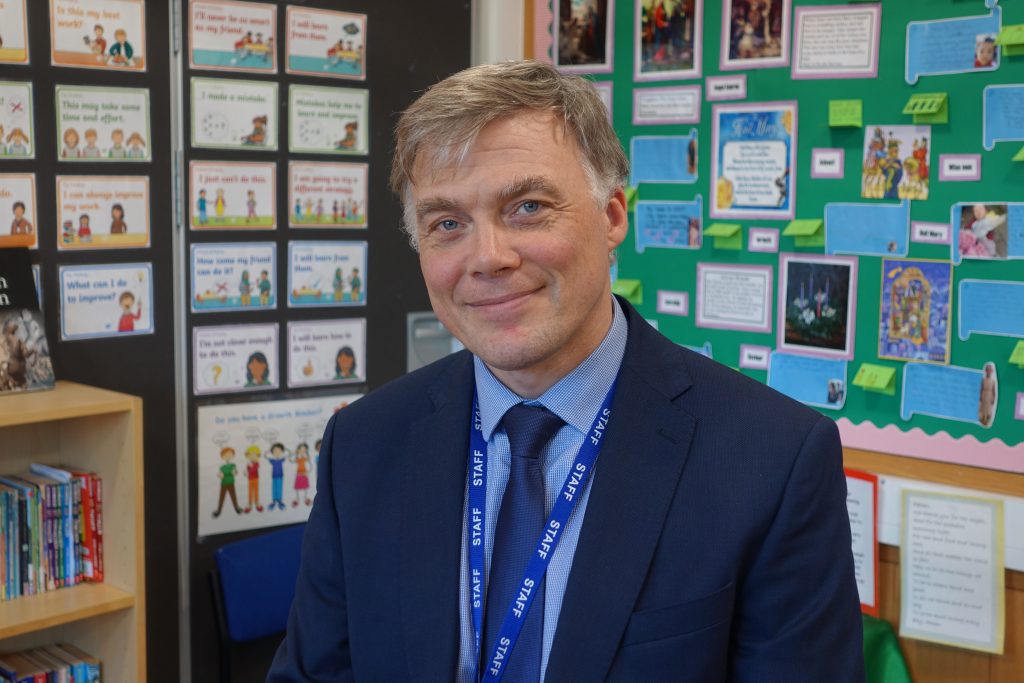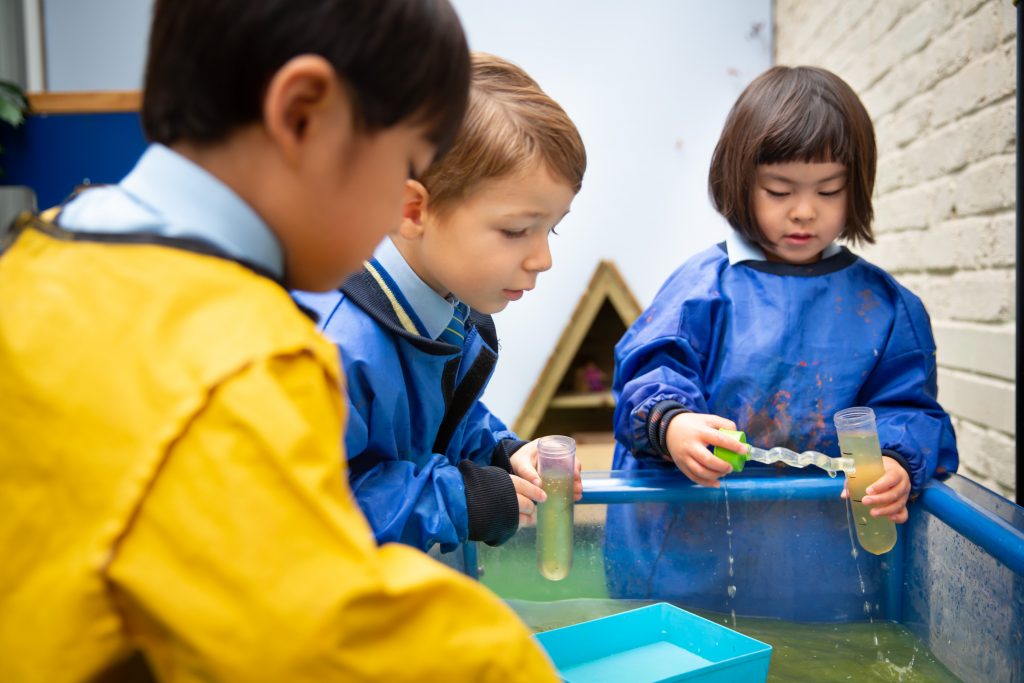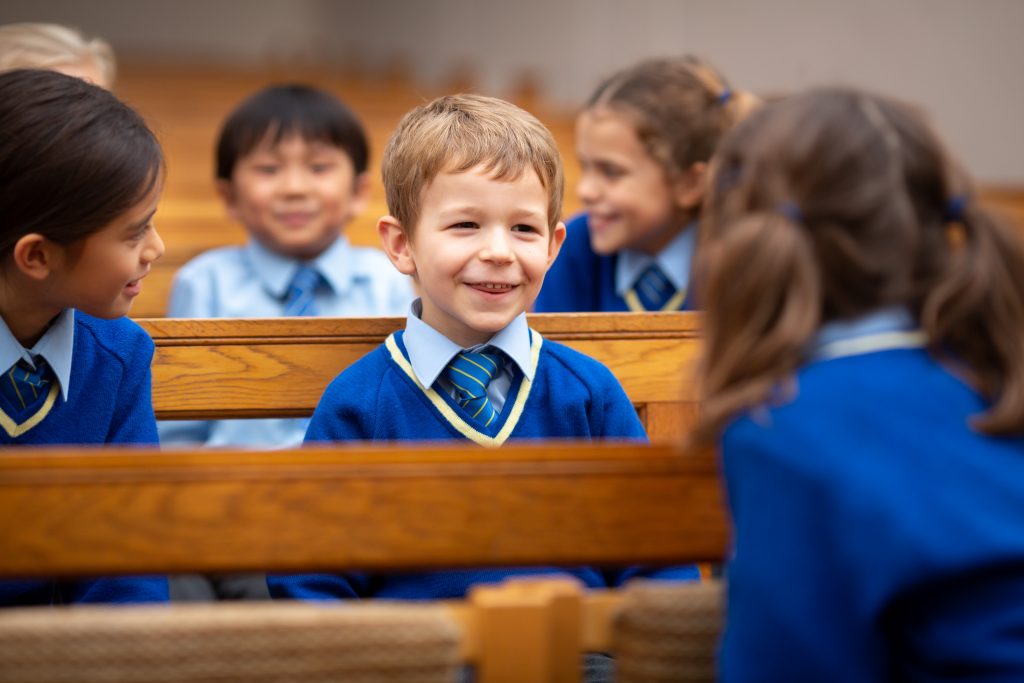 Alastair Gloag studied history at Nottingham University before training as a teacher. Through his career, Alastair has worked in selective, non-selective, single-sex and co-educational day and boarding school settings. Alastair has been the Head of Saint Christina’s since September 2018.
Alastair Gloag studied history at Nottingham University before training as a teacher. Through his career, Alastair has worked in selective, non-selective, single-sex and co-educational day and boarding school settings. Alastair has been the Head of Saint Christina’s since September 2018.
You have been Headmaster at Saint Christina’s since August 2018. Please tell us what attracted you to the school in the first place and what the biggest changes you have undertaken so far are.
It is easy to say that Saint Christina’s felt special, but it just did. I have worked in six different schools, all of which have been for children aged 3-18, and they have all had their charms. However, there was an authenticity and warmth to Saint Christina’s that was deeply attractive to me when I was invited to discuss taking up the role. It felt as if the school was serious about the business of ‘growing children’ and not just teaching them.
There have been some very big changes over the last two or so years. The first was being able, in September 2018, to confirm the decision to move from part to full co-education. Allied to this, and in line with our desire to make our co-educational offering the very best available, we have also made the decision to have two classes in each year group where we have traditionally had a single class. In order to achieve this, we have been exploring ways in which we can expand our capacity and I am delighted to say that we have been granted planning permission to replace our current EYFS classrooms with a new state of the art facility which will include lovely features including cooking, break out and enhanced outdoor learning areas. Above the EYFS area will be four new classrooms that will include outdoor learning spaces. So, at the end of the project, we will have an incredible new facility that will allow us to expand our provision and achieve our vision of providing the best co-educational prep school education that anyone will be able to find in Central London.
What future plans do you have for the school?
The plans that we have revolve around our decisions to go fully co-educational. We will see the main extension to the school completed by spring 2022 and we are really excited that we can achieve such a massive upgrade in such a short space of time and are already planning how we will kit everything out.
As part of our move to full co-education we have been keen to have a thorough deep review of the curriculum to ensure that it is as engaging, stretching, fun and ambitious as it should be for both boys and girls. Some of the more exciting headlines that have emerged from this review have been a new emphasis on STEM that has included an entirely new science curriculum, the introduction of numerous STEM, coding and robotics’ clubs and, most recently, engineering, in the form of our Formula 1 in Schools provision.
We have been keen to explore the things that we might do from the perspective of the environment, to make the world a better place to live in. We began making and collecting ‘Eco-bricks’ just over a year ago, and on the back of that, were pleased to appoint Susannah Wheatcroft as ‘Sculptor in Residence’ in October 2020. She was commissioned to make a dolphin out of our ‘Eco-bricks’ and this has now been installed in the playground with the very simple message: “our single-use plastic is in our dolphin and not a real one.” At the same time, we installed a green wall to underline our commitment to softening the space around the school. At the heart of these initiatives, however, has been a regard to ‘Laudato Si’; the Pope’s call for all people to become better stewards of the world that we all live in.
Taking things forward, we are currently engaging with students from Imperial College and with Westminster Council to look at ways we can both engage with, and set a template for other schools to engage with the issue of air quality. We understand that we can’t change the whole world, but we believe we can change the ‘world where we live’ and if we can encourage a generation of children to think in a similar way, then we can make a very profound impact in time.
You have now gone fully co-ed. Why did you decide on that?
Saint Christina’s has always been co-educational but you are right to say that people have generally perceived us as a girl’s school because the boys used to leave at 7+. So our decision to go fully co-educational in 2018 is really the fulfilment of what we have always wanted to be: a school filled with happy, confident successful boys and girls.
Over my time in education, I have worked in both single-sex and co-educational settings and have always felt that whilst I have enjoyed all of the roles that I have had in the different schools, co-education reflects the world we live in. There is no widely respected body of research that can prove that single-sex schooling is better than co-educational. Most of the research that does exist to support the assertion has been written or commissioned by schools and organisations with an interest. It is certainly true that many of the schools at the top of league tables are single-sex, however, this is as much to do with a high level of selection and great teaching as much as the school being single-sex.
As a father of four children, I have made the decision to place my children in non-selective co-educational settings throughout their schooling and they have thrived both academically and socially. As a teacher, I have found that boys can be better boys when they are in a co-educational setting and that girls can be better girls simply because they are together.

What is the balance between boys and girls at Saint Christina’s?
At the moment, over the whole school, the balance remains in favour of the girls, however, I am delighted to say that we will see our first cohort of boys move through into Year 3 in September 2021, so it is only a matter of time before we will be where we want to be. It is possible that boys may even marginally outnumber the girls in some of our lower years next September!
What do you do to prevent Year 5 and Year 6 from becoming too exam centric?
This is a great question because it is essential in the very competitive London 11+ environment that the children perform well at 11+. I think that we get a really good balance here because our outcomes have been excellent, however, I would be really sad if someone said that we achieved these outcomes by being an exam factory. The first thing that we do is to create a journey from Year 4 through to Year 6. There is a gradation of emphasis and concentration on the things that the children need to master well in the 11+ process. Our curriculum remains rich and broad with a strong emphasis on specialist subjects and the provision of lots of extra-curricular activities. English and Maths are prioritised so that every child in the School has an hour of each a day. In Year 5, our preparation becomes more focused and there are lots of opportunities to engage with learning outside of class time and through the holidays via online applications such as BOFA and the Atom Learning Platform. However, even at this stage, we ensure that the children are fully involved in all the things that a child should be able to do at this age, such as playing in sporting fixtures or take part in one of the many school instrumental groups. Most children sign up for a good number of clubs and activities after school which, I think, only helps.
I think too, that the emphasis we have on the development of the whole child and the time we spend thinking about who we are and how we might want to live also helps the children to feel confident, safe and mentally resilient at a time when they are under quite a bit of pressure.
What are your views on boarding? What type of student does it suit best?
As someone who has worked in three boarding schools, I guess I am always going to say that I think it’s got its benefits; however, I would also say that it suits some children and not others. Boarding can be a really rich experience because there has to be a 24/7 provision and the children need to be kept active and engaged. There will normally be a very powerful provision in sport, music and drama, but beyond these, a very large range of activities that should ensure that every child finds something that they like. The boarding experience is great for character development too. The simple fact that children interact in a more independent way leads to the development of confidence and maturity.
In my experience, the children who thrive most in boarding schools are those who are prepared to throw themselves into everything that is going on. They should be comfortable in their own skin and have a level of confidence in themselves. Children who relate well to others and who want to make friendships settle in quickly. It probably goes without saying that the key to ensuring a good boarding fit with a child is to ensure that they want to be a boarder and that they are comfortable with the idea of being away from home.
Boarding in the 21st Century is different to the sort of experience that we might have had as parents, and children can opt for weekly and flexi boarding in addition to the traditional offering. I found, as the Head of a day and boarding school that day children who attended the school also benefited from the boarding provision. They would often opt into all sorts of different activities that might not have been provided within an exclusively day-school environment and many would find their day was long and rewarding without being resident. In addition to this, parents of day children who had need, could book their children in to board on an occasional basis – some even used the facility to take a mid-term break in the sun!
What does it mean to be a religious school these days?
Educating children in the Catholic tradition means being part of a warm, caring and compassionate community in which everyone is encouraged to think about others and care for our environment. Our core values are love, joy, peace, faithfulness, patience, goodness, gentleness, kindness and self-control, and these are what we seek to find in our daily lives in school. You only have to look at social media to see how easily people in society can slip into intolerant and abusive behaviour. I believe that our ethos gives us a reference point and an anchor to who we are and who we would like to be – and I truly believe that our community allows the children to grow in a safe and nurturing environment that allows them to express themselves in a way that they might not be able to if they did not feel so safe in doing so.

For families of different faiths or for those who are unsure of sending their child to a Catholic school, what would you say to them about applying to Saint Christina’s?
Saint Christina’s is a school that has, within its community, children from many different backgrounds and who practise their own faith. I suppose it might be easy to think that a Catholic school will want to set out to influence the children to a particular set of beliefs; however, that is not how it works and, it is not how we believe Christ operated when he had his ministry on earth. Christ took people where they were and he loved them. We are called to do the same. We do not set out to convert but we do pray. We say grace at dinner time to express our gratitude for the things that we have and could easily take for granted. We encourage the children to reflect and think about who they are and who they would like to be. We emphasise kindness and compassion and we would hope that these things are both desired and desirable to families, whatever their faith (or non-faith) might be. The fact that we have so many families who actively practise a different faith to our own within our community is a good signal that we achieving the right balance. I would say to any family who may want to understand what our being a Catholic school means, to come and speak with me directly and to come and see us.
What are the biggest challenges both parents and schools are facing right now when bringing up and educating children?
Aside from the pandemic, I think that a key challenge is the pace of change in the world that the children are growing up in. The reality is, that many of the jobs that the children who are currently at the beginning of the educational journey will go on to have, have probably not even been invented yet. The evolution of the technological world that the children already inhabit is rapid and it is essential that schools realise that children need an education that will develop them as flexible, agile, highly independent, analytical and confident learners. Schools need to adapt to the new world and ensure an educational provision that emphasises the powerful development of skill and character over an ability to know a lot about something and pass an exam. Easy access to all sorts of information and material through the internet and the influence and the power of social media in the development of the children around us is also very significant as parents and schools find that our voices are perhaps not as dominant in the formation of our children as they might have been in the past.
What do you love most about your job?
At last! An easy question! The children. Seeing them smile and enjoy school! When you work in a school as I do, the children accept you for what you are and no idea is too crazy, so we can achieve a lot of things in a day. My job is, quite simply, the best in the world.



